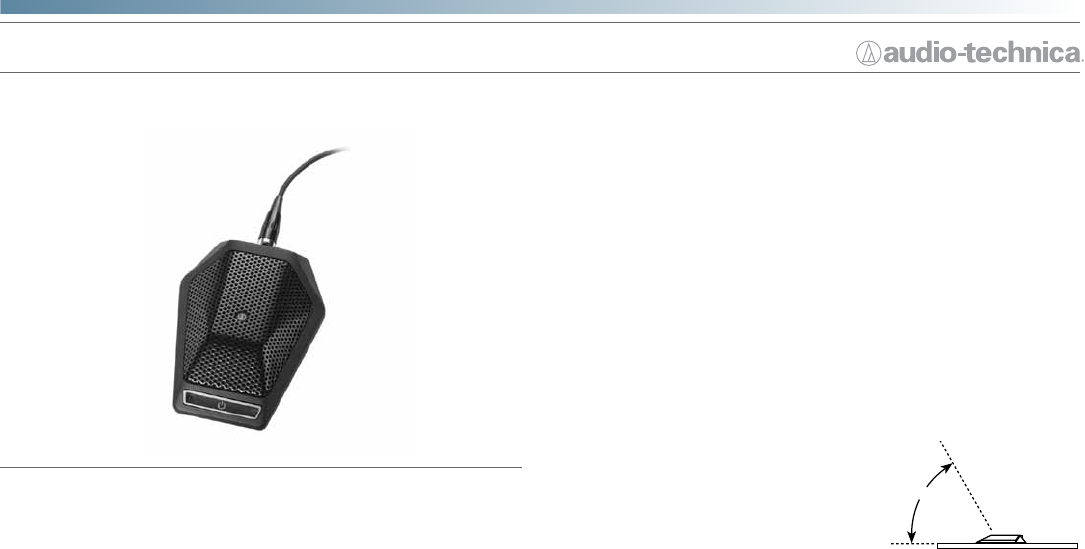
unipoint
®
microphones
Cardioid Condenser Boundary Microphone with Local or Remote Switching
U891RC
Features
• Electronic switch can be set to any of three operating modes:
“touch-on/touch-off,” “touch-to-talk” and “touch-to-mute”
• External contact closure capability permits control of remote
devices from microphone switch
• External LED control allows for accurate depiction of the live
status of the microphone
• PivotPoint
®
rotating output connector allows cable to exit from
either the rear or the bottom of the microphone
• UniGuard
®
RFI-shielding technology offers outstanding rejection
of radio frequency interference (RFI)
• UniSteep
®
lter provides a steep low-frequency attenuation to
improve sound pickup without affecting voice quality
• Available interchangeable elements permit angle of acceptance
from 100° to 360°
• Heavy die-cast case and non-slip silicon foam bottom pads
minimize coupling of surface vibration to the microphone
Description
The U891RC is a wide-range condenser microphone with a cardioid
polar pattern. It is designed for surface-mount applications such as high-
quality sound reinforcement, conferencing, distance learning and other
demanding sound pickup applications.
The microphone features an ultra-quiet electronic touch switch,
programmable external contact closure and LED indicator. The electronic
touch switch can be set to any of three operating modes: "touch-on/touch-
off," "touch-to-talk" and "touch-to-mute." The microphone's external contact
closure capability permits control of remote devices. The contact closure
can also be congured to operate independently of the microphone
element for applications that require a constant signal from the
microphone element. A switch on the bottom of the microphone allows
selection of local or remote operation. (In remote operation, the LED and
electronic touch switch operate independently of the microphone.)
A third position on this switch enables the LED to be controlled from an
external source.
The microphone requires 11V to 52V phantom power for operation.
The microphone is equipped with UniGuard
®
RFI-shielding technology,
which offers outstanding rejection of radio frequency interference (RFI).
The microphone’s cardioid polar pattern provides a 120° angle of
acceptance (cardioid in hemisphere above mounting surface). Additional
interchangeable elements with omnidirectional (360°) and hypercardioid
(100°) pickup patterns are available.
The microphone includes a 7.6 m (25’) output cable terminating in a
special TA5F-type connector at the microphone end. The equipment
end is stripped and tinned for connection to an electronic device. The
microphone is equipped with Audio-Technica’s unique PivotPoint
®
rotating
output connector.
A switch permits choice of at response or low-frequency roll-off (via
integral 80 Hz high-pass UniSteep
®
lter) to help control undesired
ambient noise.
The microphone’s heavy die-cast case and non-slip silicon foam bottom
pads minimize coupling of surface vibration to the microphone. The
microphone includes a soft protective pouch and features a low-
reectance black nish.
Installation and Operation
The U891RC requires 11V to 52V phantom power for operation.
The electronics in the microphone take up to 30 seconds to stabilize after
power is applied; during this start-up period, some sonic disturbances may
be heard upon switching if the system is “live.”
The microphone should be placed on a at,
unobstructed mounting surface, with the front
of the microphone facing the sound source.
The sound source should not be below,
or higher than 60° above, the plane of the
mounting surface.
The microphone features a touch-sensitive on/off switch, indicator
LED and external contact closure ability for controlling remote devices.
The microphone offers three choices of switching modes. The SW.
FUNCTION switch located on the bottom of the microphone selects the
desired mode. TOUCH ON/OFF: Touch the on/off switch once to turn
the microphone on; touch again to turn off. MOM. ON (momentary
on): Microphone is on only while the switch is being touched (“press
to talk”). MOM. OFF (momentary off): Microphone is off only while the
switch is being touched (“press to mute”). The indicator LED and external
contact closure follow the operation of the touch switch when in the local
mode. For applications that require the microphone to remain active or
always “on”, regardless of the touch switch setting, a “Local/Remote/ LED
Remote” control function is provided.
• When the CONTROL switch (located on the bottom of the microphone)
is in the “Local” position, the touch switch controls the microphone's
audio output, LED status and contact closure internally.
• When the CONTROL switch is in the “Remote” position, the
microphone's audio output remains active or “on” all the time. The touch
switch controls only the LED and contact closure.
• When the CONTROL switch is in the “LED remote” position, it allows
remote control of the LED, for accurate depiction of the microphone's live
status. The LED will remain “on” when driven logic high or open, and “off”
when driven logic low or connected to ground. The microphone's audio
output remains active or “on” all the time, and the contact closure follows
the conguration of the touch switch.
*Refer to the table for switch/LED/closure states.
Output is low impedance balanced. The signal appears across the red and
yellow wires; audio ground is the shield connection. Output is phased so
that positive acoustic pressure produces positive voltage on the yellow
wire. The small-diameter black and blue wires are the contact closure. The
white wire is the external LED control.
An integral 80 Hz high-pass UniSteep
®
lter provides easy switching from
a at frequency response to a low-end roll-off. The roll-off position reduces
the pickup of low-frequency ambient noise (such as trafc, air-handling
systems, etc.), room reverberation and mechanically coupled vibrations. To
engage the UniSteep
®
lter, slide the switch toward the “bent” line.
The microphone’s PivotPoint
®
rotating output connector allows the cable
to exit from either the rear or the bottom of the microphone without the
need for tools or disassembly.
Avoid leaving the microphone in the open sun or in areas where
temperatures exceed 110° F (43° C) for extended periods. Extremely high
humidity should also be avoided.
60°
IDEAL
WORKING
ANGLE
